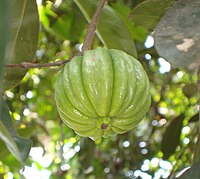
Photo from wikipedia
Background Studies regarding treatment of acute toxicity with diclofenac (ATD) are quite few. Diclofenac is commonly prescribed in neurology, psychiatry, and general medicine practice. This study investigated possible colon-protective effects… Click to show full abstract
Background Studies regarding treatment of acute toxicity with diclofenac (ATD) are quite few. Diclofenac is commonly prescribed in neurology, psychiatry, and general medicine practice. This study investigated possible colon-protective effects exerted by Ajwa date fruit extract (ADFE), a prophetic medicine remedy native to Al-Madinah, Saudi Arabia against ATD. Phytochemicals in ADFE as gallic acid and quercetin have reported protective effects against ATD. Methods Total phenols and flavonoids in ADFE were estimated as equivalents to gallic acid and quercetin. Four experimental groups were allocated each of six rats: control group, ATD group received a single dose of 150 mg diclofenac intraperitoneally, toxicity prevention group received a single dose of ADFE orally followed 4 hours later by diclofenac injection, and toxicity treatment group received a similar diclofenac dose followed 4 hours later by a single dose of ADFE. Four days later, animals were sacrificed. Histological and biochemical examinations were done. Results ADFE has a total phenolic content of 331.7 gallic acid equivalent/gram extract and a total flavonoid content of 70.23 quercetin equivalent/gram. ATD significantly increased oxidative stress markers as serum malondialdehyde (MDA) and hydrogen peroxide (H2O2). Serum MDA and H2O2 were significantly scavenged by ADFE. ATD significantly (p<0.001) decreased antioxidant power as serum total antioxidant capacity and catalase activity. That was reversed by ADFE in both prevention and treatment groups. Histologically, ATD caused complete destruction of colonic crypts architecture, patchy loss of the crypts, loss of the surface epithelium, absent goblet cells and submucosal exudate, heavy infiltration of the lamina propria and submucosa with inflammatory cells, mainly lymphocytes and eosinophils. There were mucosal haemorrhages and submucosal dilated congested blood vessels. All that was prevented and treated using ADFE. Conclusion ADFE is rich in quercetin and gallic acid equivalents that exert potent antitoxic effects. ADFE is strongly recommended for preventive and therapeutic colon effects against ATD.
Journal Title: Drug Design, Development and Therapy
Year Published: 2022
Link to full text (if available)
Share on Social Media: Sign Up to like & get
recommendations!